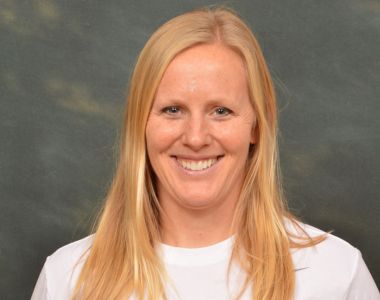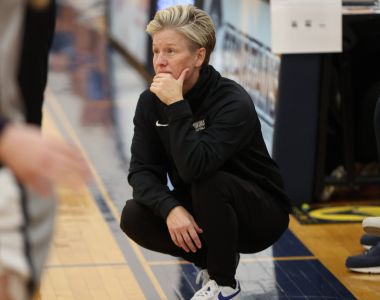When it comes to physical fitness and overall well-being, it’s no secret there’s a profound connection. At Case Western Reserve University, coaches of Spartan athletic teams excel at putting this connection to good use.
From basketball to softball and beyond, each coach excels at bringing out the best in student-athletes. They understand the crucial balance of self-care, recognizing that nurturing their own wellness is essential to effectively guiding and supporting their teams.
This guidance extends beyond athletics. CWRU coaches know physical fitness comes in many forms, from daily walks with the dog to yard work, marathon training, mountain climbing and beyond. While the spectrum of activity varies, experts agree that moving the body should be a priority.

“Physical fitness helps to increase longevity, decrease the likelihood of certain diseases including cardiovascular disease and some cancers, and makes the activities of daily living easier,” said Jessica C. Taylor, an assistant professor at the university’s School of Medicine.
Taylor adds that many who identify as women tend to focus on losing weight when it comes to working out, but urges not to put too much emphasis on the scale.
“The number may not change and may even increase as we begin fitness regimens because we are changing body composition by building muscle which weighs more than fat mass,” Taylor said.
Case Western Reserve’s Josie Henry, head softball coach and associate professor in the Department of Physical Education, agrees.
“There is a ton of pressure for women (in society and social media) to look a certain way,” said Henry. “I focus on loving life and surrounding myself with great people who support healthy lifestyles and create true happiness.”
In recognition of May being National Physical Fitness Month and National Women’s Health Month, The Daily sat down with Henry and two other Spartan coaches—Brooke Beecher and Jennifer Reimer—and asked them to share their fitness journeys, goals and motivations. Read on to learn their perspectives on physical fitness and women’s health.
Answers have been lightly edited for length and clarity.

Brooke Beecher
Assistant Women’s Basketball Coach and Sports Performance Dietitian
What does your fitness routine typically look like?
I try to get some form of physical activity in every day. Most recently that’s been cardio five days a week and strength training three days a week. I mix up what that looks like—running, cycling class or interval workouts.
What sports do you participate in?
At this stage of life, triathlons are my thing—all distances from sprint up to Ironman. I love the variety of training it requires, and I usually use it as a good excuse to travel to cool places.
Have you always been physically active?
Yes, for as long as I can remember. My dad and mom were coaches my entire life so I remember running around with their teams the minute I could walk, and I did my first triathlon when I was 10.
How does your commitment to fitness influence your athletes?
While a college sport might only last four years, fitness and taking care of yourself is a lifelong necessity—even when your competitive career is over, you can still work toward something. Plus, if I’m asking them to push hard in a sprint, I would expect the same of myself. I probably couldn’t beat them, but I would want to at least try!
What challenges have you faced in maintaining your fitness?
Consistency! A busy schedule can sometimes be an easy excuse to “do it later.” I’ve found even if it’s just 10 minutes, it makes a huge difference in how my whole day goes.
What are your long-term fitness goals?
Ironman Alaska is on my bucket list!
How do you stay motivated?
I remind myself how much better I feel mentally and physically when I stay active. I also now have an 18-month-old daughter who I want to set an example for. My mom set a strong example for me and it made an impact.
What will your physical fitness routine look like 10 years from now?
Hopefully, more of the same, getting something in daily!
What have your student-athletes taught you about fitness?
Diversifying workout programs to meet individual needs is important, it’s not one-size-fits-all!

Josie Henry
Head Softball Coach and Associate Professor in the Department of Physical Education and Athletics
What does your fitness routine typically look like?
I pursue strength training, indoor cycling and CrossFit workouts.
What sports do you participate in?
I love volleyball and softball. I play flag football and basketball with my kids.
Have you always been physically active?
Yes, and I love to get outdoors and enjoy nature too!
Are there specific training methods or principles you incorporate into both your personal routine and coaching practices?
Yes, periodization is very important. We plan from start to finish for the year (including rest and recovery) and we use shorter four-week programs to help adjust volume and intensity. We begin with teaching technique as our foundation and we build to heavier loads about four weeks before we begin games.
How does your commitment to fitness influence your athletes?
I can give more when I feel my very best. I also teach cycling classes so I can not push them without keeping my own fitness levels. I also throw batting practice daily and I keep healthy through proper strength training.
What challenges have you faced in maintaining your own fitness?
I am a mom of three children in elementary school so finding time to put myself first and get in my workouts can be very challenging during our busy season.
What are your long-term fitness goals?
I would like to continue to feel strong and healthy while fulfilling my duties as a coach and mom. I want to stay active throughout all years of my life.
How do you stay motivated?
Enjoy the activities you participate in. I enjoy taking group classes led by an instructor. I work to incorporate daily movements in my life like taking the stairs, going for walks and playing in the yard with my kids.
What will your physical fitness routine look like 10 years from now?
I plan to continue to enjoy physical fitness. I hope to have more time for other activities like pickleball and golf!
What have your student-athletes taught you about fitness?
Everything! Their hard work and dedication are truly inspiring. I love the opportunity to work with them daily and the front-row seat to watch their growth over collegiate careers.

Jennifer Reimer
Associate Professor of Physical Education, Head Women’s Basketball Coach
What does your personal fitness routine typically look like?
I run three to four times a week, anywhere from two to four miles per run. Playing a little pickleball and any fun games my 11-year-old wants to run around and do.
What sports do you participate in?
Running, golf, pickleball, bike riding, and light basketball activities!
Have you always been physically active?
I have. I loved playing any and all sports and riding my bike with the kids in my neighborhood. I played sports all through high school and college.
Are there specific training methods or principles you incorporate into both your personal routine and coaching practices?
I try to use the same positive self-talk to get through the workouts that I use with my athletes.
How does your commitment to fitness influence your athletes?
I hope it is a way to model positive behavior for our student-athletes.
What challenges have you faced in maintaining your own fitness?
Most of my challenges have been when I felt unmotivated and wasn’t following a healthy diet routine.
What are your long-term fitness goals?
My main fitness goals are to maintain a healthy lifestyle to live a long and healthy life.
How do you stay motivated?
I do my best to remember how wonderful I feel after I’ve worked out. I’m always so very proud when I’ve been physically active (and I always sleep so much better!)
What will your physical fitness routine look like 10 years from now?
I imagine my knees may want me to back off from as much running 10 years from now. I see myself continuing to play golf, pickleball and riding a bike, but going for long walks rather than running.
What have your student-athletes taught you about fitness?
Watching my student-athletes succeed in competition when they are the stronger, more fit athlete always reinforces that we are capable of more than we know. If you work hard every day, great things are possible.

